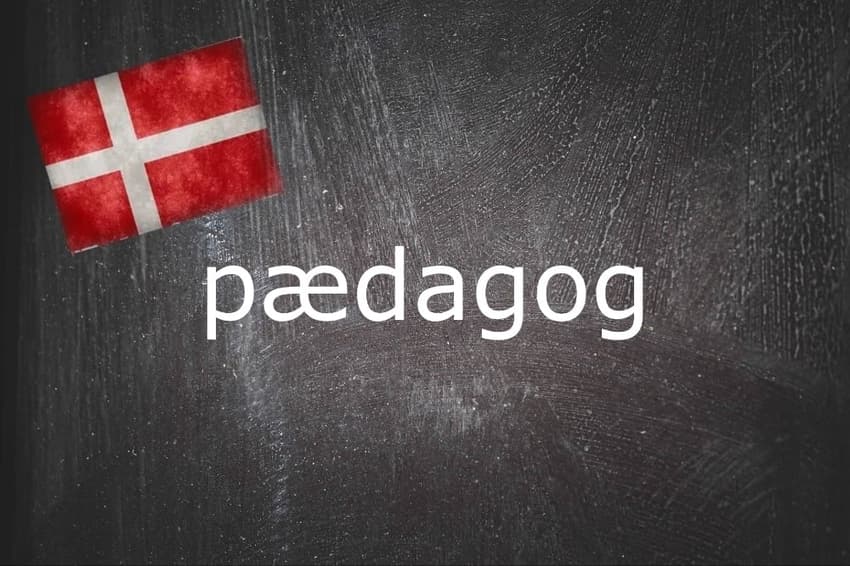Danish word of the day: Pædagog

Photo by Francesco Ungaro on Unsplash and Nicolas Raymond/FlickR
This Danish word of the day is a crucial one in the country’s daily life and you will hear it countless times, but it is not easy to translate.
What is pædagog?
A pædagog is someone who works within the field of pedagogy, a term which exists in English (but may not be widely known) and refers to the theory and practice of teaching and learning.
In Danish, pedagogy is pædagogik and someone who is trained in that profession is a pædagog.
This doesn’t really come close to covering how the word is used in Danish, however, where it refers to a range of different jobs, all crucial to the smooth running of everyday society.
Why do I need to know pædagog?
Beyond the dictionary definition of “person who is trained to work in pedagogical occupation with children, young or disabled people”, there’s a good number of compound words that include pædagog.
These compound words are mostly job titles and demonstrate the different specialisations and roles in which you can work as a pædagog.
These include småbørnspædagog for those who take care of small children, børnehavepædagog for the trained childcare staff at kindergartens, and socialpædagog for people who work with adults with special social needs.
To become a pædagog you must complete the pædagoguddannelse, the professional training for the rule, which is a three-and-a-half year vocational degree involving work placements and a certain degree of specialisation.
Untrained staff who work in kindergartens can take the job title pædagogmedhjælper, literally “pedagog helper”, and often fulfil many of the same duties, particularly those relating to the care, compassion and supervision needed to look after a group of children.
Denmark has a high provision of childcare, with kindergarten fees subsidised by local authorities – up to 80 percent of one-year-olds attended childcare institutions in 2022 with that figure rising to 97 percent for five-year-olds, according to national figures.
That may give you an idea of how many skilled childcare professionals Denmark needs and why a word that has a niche, technical meaning in English is so common in Danish.
Comments
See Also
What is pædagog?
A pædagog is someone who works within the field of pedagogy, a term which exists in English (but may not be widely known) and refers to the theory and practice of teaching and learning.
In Danish, pedagogy is pædagogik and someone who is trained in that profession is a pædagog.
This doesn’t really come close to covering how the word is used in Danish, however, where it refers to a range of different jobs, all crucial to the smooth running of everyday society.
Why do I need to know pædagog?
Beyond the dictionary definition of “person who is trained to work in pedagogical occupation with children, young or disabled people”, there’s a good number of compound words that include pædagog.
These compound words are mostly job titles and demonstrate the different specialisations and roles in which you can work as a pædagog.
These include småbørnspædagog for those who take care of small children, børnehavepædagog for the trained childcare staff at kindergartens, and socialpædagog for people who work with adults with special social needs.
To become a pædagog you must complete the pædagoguddannelse, the professional training for the rule, which is a three-and-a-half year vocational degree involving work placements and a certain degree of specialisation.
Untrained staff who work in kindergartens can take the job title pædagogmedhjælper, literally “pedagog helper”, and often fulfil many of the same duties, particularly those relating to the care, compassion and supervision needed to look after a group of children.
Denmark has a high provision of childcare, with kindergarten fees subsidised by local authorities – up to 80 percent of one-year-olds attended childcare institutions in 2022 with that figure rising to 97 percent for five-year-olds, according to national figures.
That may give you an idea of how many skilled childcare professionals Denmark needs and why a word that has a niche, technical meaning in English is so common in Danish.
Join the conversation in our comments section below. Share your own views and experience and if you have a question or suggestion for our journalists then email us at [email protected].
Please keep comments civil, constructive and on topic – and make sure to read our terms of use before getting involved.
Please log in here to leave a comment.